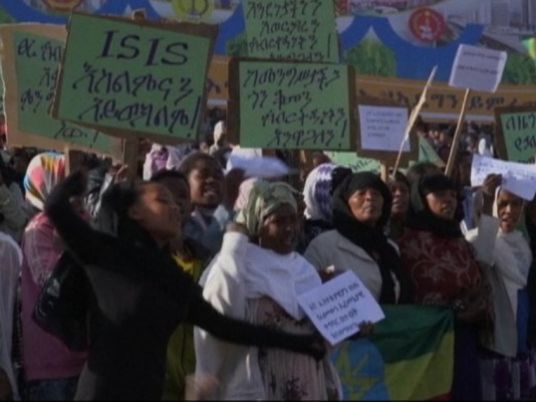
Tens of thousands of Ethiopians marched through the capital Wednesday in a government-organised rally condemning the murder of a group of Ethiopian Christians by Islamic State (IS) militants in Libya.
The official rally appeared to be aimed at channelling public anger sparked by the killings, with a huge crowd beginning to gather shortly after dawn in Addis Ababa's huge Meskel Square. However, some demonstrators directed their anger at the government.
"Our brothers were murdered, the government must do something," shouted Anteneh Tefera, a young demonstrator. "Their blood is not the blood of animals."
The murders have horrified Ethiopians and sparked global condemnation, including from Pope Francis who expressed his "great distress and sadness".
The IS video, released on Sunday, showed militants in Libya holding captives who they described as "followers of the cross from the enemy Ethiopian Church".
It showed one group of about 12 men being beheaded on a beach and another group of at least 16 being shot in the head in a desert area.
"We gather to commemorate the innocent children of Ethiopia butchered by terrorism and burned to death by xenophobia," said one speaker on the podium, also referring to the wave of violence against immigrants in South Africa.
Protesters responded by singing, "Enough immigration! Change our country by staying home."
A large number of Ethiopians leave their country — Africa's second largest in terms of population with more than 90 million people — seeking work elsewhere.
At least two of those killed were trying to cross to Italy when they were captured, their families have said.
Many travel to Libya and other north African nations for jobs, as well as to use it as a stepping stone before risking the dangerous sea crossing to Europe.
Europe's southern shores have been swamped with migrants fleeing war and hardship, hundreds of whom have died in a string of tragic shipwrecks.
Elections approaching
Almost two-thirds of Ethiopians are Christians, the majority of those Orthodox Copts — who say they have been in the Horn of Africa nation since the first century AD — as well as large numbers of Protestants.
Islam also has an ancient history in Ethiopia, brought to the country by some of the earliest followers of the Prophet Mohammed, who were sheltered there by the Christian king.
"ISIS doesn't represent Islam," read one banner held by protester. "Our peace and our unity will never broken by the extremists," another read.
But despite a heavy police presence, several anti-government slogans were heard.
"We are tired of speeches and propaganda! We want action! Revenge for our brothers!" shouted a group of youths, who were quickly surrounded by a police cordon.
"Ethiopia sent troops to Somalia, Liberia, Burundi, but the government is not capable of protecting its own citizens!" shouted one protestor, referring to its peacekeeping roles in the African Union or United Nations.
"Where is the African Union? Where are the Ethiopian defence forces?" a placard carried by a protester read, written in English.
Police fired a few rounds of tear gas at some rowdy groups with the demonstration ending before midday.
At the home of two of the victims in capital's Cherkos district, a banner was displayed showing them kneeling just before their deaths.
"A government that does not protect its citizens does not deserve to be in power," the banner read.
The rally comes a month before Ethiopia holds parliamentary elections, the first since the death of long-time leader Meles Zenawi.
Current Prime Minister Hailemariam Desalegn faces little, if any, opposition challenge.
The government has promised to help repatriate migrants who are still in Libya and has warned its citizens not to go to areas where Islamic State group is active.
"We will redouble efforts to fight terrorism," foreign ministry spokesman Tewolde Mulugeta said, in reaction to demands for action from protesters.
He said Ethiopia was trying to create jobs so the people did not feel they had to leave to find work.
"We're trying to create opportunities here for our young people," he added. "We encourage them to exploit those opportunities at home."




